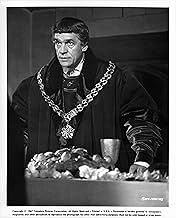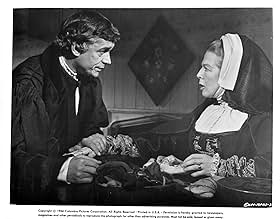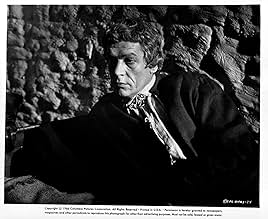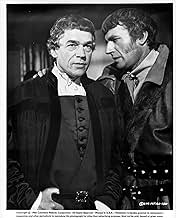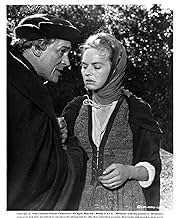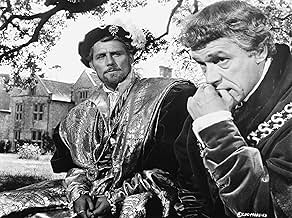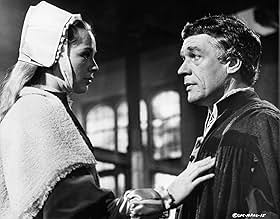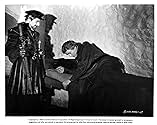La historia de Tomás Moro, que se enfrentó al rey Enrique VIII cuando este rechazó a la Iglesia católica romana para obtener el divorcio y volver a casarse.La historia de Tomás Moro, que se enfrentó al rey Enrique VIII cuando este rechazó a la Iglesia católica romana para obtener el divorcio y volver a casarse.La historia de Tomás Moro, que se enfrentó al rey Enrique VIII cuando este rechazó a la Iglesia católica romana para obtener el divorcio y volver a casarse.
- Ganó 6 premios Óscar
- 34 premios y 9 nominaciones en total
Reseñas destacadas
I can't add anything to what has already been said about A Man for All Seasons. Unquestionably one of the greatest films of all time, and stands the test of time. It will be revered as a great film 100 years from now. Will Lebowski? Doubt it. Winner of nearly every award it was nominated for. Best Picture, Best Director, Best Actor, Best Screenplay, etc. One of the few movies that makes my whole being vibrate when I watch it. I am moved to tears in almost every scene because the scene is executed so perfectly.
Please IMDb, this must give you pause. Any system that does not put this film in the top 100 borders on insanity or uselessness.
It's not that More objects, rather that he doesn't go along with it. He never says he's against it because that way he could be charged with treason but he doesn't sign the new law passed in favor of the king. He could get away with this, of course, but Henry VIII stubbornly refuses to have any opposition, and the rest of the movie is spent on characters trying to persuade More to abide, for this reason or that. There is also a subplot about Richard Rich (a young John Hurt) and Thomas Cromwell (Leo McKern) plotting to frame More to quiet him.
That is what I got from the plot, at least. I could be wrong. It was hard to follow, this film, because of the fast fury of dialogue in each scene, never relenting for the audience to understand. This fast approach to the subject matter wasn't too tedious, but it did prompt me to rewind a few times to hear things over.
That, I am glad to say, is the movie's only flaw. Everything else is wonderful. The acting was great. Scofield creates a sense of pride, duty, confidence and principle with his character that gives him a high, strong presence whenever he's onscreen. His character is complex and in a way simple. Simple: he's refusing to relent not because he believes strongly on the issues of marriage and divorce, but because he believes strongly that no one, not even the king, is above the law. Complex: his strength and duty begins to become self-destructive when he is jailed, his family is made poor and unhappy and he loses respect from most around him, all the while still refusing to conform. An Oscar well deserved.
The rest of the cast rounds out nicely. We have Orson Welles in a small role as the gruff Cardinal Wolsey, Leo McKern using scorn as his technique as Cromwell, Hurt playing a sad role that goes from nice and likable to selfish and nasty, and much others. Ones that stood out for me were Robert Shaw and Wendy Hiller, both Oscar nominated. Shaw is loud, rude, stupid, and in some way likable as the king, it's not his best performance but it is an entertaining one. Hiller, playing More's wife, creates a character whose pride and strength diminishes when her husband is punished, revealing what we least expected: love.
Also, the film is beautifully shot. Its scenery is nice, but how the camera captures it is better. The set direction and costumes are also very impressive, making the film as much a wonder to look at, as it is to watch. And notice how as the movie progresses and More's situation becomes more and more hopeless the tones become muddier; there are more grays and browns than the reds and oranges from early on.
The film won the 1966 Academy Award for Best Picture. I liked `The Sand Pebbles' a little more, but it was still a deserved win in my book. A great picture, made better by Scofield's powerful performance, 8/10.
This splendid costumer-drama contains excellent performances by all star cast. Paul Scofield won deservedly Academy Award as upright chancellor with fateful destination but he was led from his cell in the Tower of London and beheaded. Outstanding Orson Welles at a brief appearance as Cardinal Wolsey and extraordinary plethora of secondaries as a young John Hurt, Wendy Hiller as his wife Alice, Nigel Davenport as astute Duke of Norfolk, Leo McKern as Cromwell, among others. And of course Robert Shaw as selfish King who discarded his first wife Catherine of Aragon and executed Anne Boleyn-Vanessa Redgrave in a very secondary role, in fact she refused to be paid for her supporting role-. Colorful,luxurious scenarios by John Box with evocative cinematography by Ted Moore, also Oscar winner. The movie benefits from sensible and perceptible musical score by George Delerue. Brilliant direction by Fred Zinnemann who adapted perfectly Robert Bolt's screenplay. Fred directed good films, such as: High Noon, The Seventh Cross, Act of violence, The Men, From here to Eternity, Oklahoma!, The Search, The Nun's story, The Sundowners, A Man for all seasons, The Day of the Dead, Jackal, Julia, among others. Rating: 8/10. Worth seeing. Fans of historical genre will like the film. Essential and fundamental seeing for completists of Fred Zinnemann's prosperous career.
The story is remade in 1988, an inferior TV version directed and produced by Charlton Heston with John Gielgud as Cardenal Wolsey, again Vanessa Redgrave and Heston as Thomas Moro.
"From Here To Eternity" may well be Zinnemann at his highest tide, though IMDb voters seem to prefer "High Noon." Then there's "A Man For All Seasons," the film of the year in 1966, though its hard to imagine a film that represents the ethos of the 1960s less. "A Man For All Seasons" presents us with an unfashionable character who refuses to surrender his conscience to the dictates of king and countrymen, resolute instead in his devotion to God and Roman Catholic Church.
"When statesmen lead their country without their conscience to guide them, it is short road to chaos," Thomas More tells his nominal boss, Cardinal Wolsey, when the latter unsuccessfully presses him to give his blind assent to King Henry VIII's request for a convenient divorce. Perhaps out of pique, Wolsey makes sure More inherits his office of Counselor of the Realm, where More's sterling convictions are really put to the test.
More is a marvel of subtleties, tensile steel covered in a velvet glove, a mild-mannered lion trying at every turn to do well even though his political savvy knows how dangerous that can be. As a lawyer, More knows the angles, yet he is no sharpie. He respects the law too much for that. Rather, he sees in law the only hope for man's goodness in a fallen world. "I'd give the Devil benefit of the law, for my own safety's sake," he explains.
Paul Scofield plays More in such a way as to make us not only admire him but identify with him, and come to value both his humanness and his spirituality. His tired eyes, the way he gently rebuffs would-be bribers around Hampton Court, his genuine professions of loyalty to Henry even as he disagrees with the matter of his divorce, all speak to one of those great gifts of movies, which is the ability to create a character so well-rounded and illuminating in his window on the human condition we find him more haunting company than the real people we meet in life. It's a gift the movies seldom actually deliver on, so when someone like Scofield makes it happen, it is a object of gratitude as much as admiration.
The script, adapted by Robert Bolt from his stage play, is very literate and careful to explain the facts of More's dilemma. It moves too slowly and opaquely at times to qualify "A Man For All Seasons" as a true classic, that and a supporting cast full of one-note performances, though some are quite good (a few, however, are notably flat.) I especially liked Robert Shaw as a young and thin Henry VIII, full of vigor yet also a childish temperament and inconsistent mind. He demands More not oppose his marriage to Anne Boleyn, then decides he must have either More's outright assent or else his head. There's no bargaining with such a man. Perhaps More was better off standing on his principals as he did than climbing into bed with homicidal Henry. Just ask Anne.
Zinnemann presents some interesting visual images in "A Man For All Seasons," letting the period detail inform the story without overwhelming it. Several times, such as during the opening credits, inside More's cell at the Tower of London, and during More's trial, the camera shoots through narrow openings surrounded by high stone walls, a reminder not only of More's own trapped situation but the human condition. Aspirations of divinity may be unfashionable, even dangerous to one's health, but they present mankind with its one hope for overcoming its base nature, the dead-end character of temporality. "A Man For All Seasons" is a rallying cry for just such an approach to life, and remains undeniably effective in its artful, artless way.
Oscars Best Picture Winners, Ranked
Oscars Best Picture Winners, Ranked
¿Sabías que...?
- CuriosidadesProducer and director Fred Zinnemann, as quoted in his autobiography, calls this the easiest movie he ever made, thanks to the extraordinary caliber of the crew, and the actors and actresses, and the way they worked together.
- PifiasLord Chancellor Wolsey did not die in office; he was removed from the office of Lord Chancellor by Henry (because of his displeasure at Wolsey's failure to secure a divorce from Catherine), and died more than a year after Sir Thomas More became Lord Chancellor. Wolsey did, however, remain Archbishop of York.
- Citas
William Roper: So, now you give the Devil the benefit of law!
Sir Thomas More: Yes! What would you do? Cut a great road through the law to get after the Devil?
William Roper: Yes, I'd cut down every law in England to do that!
Sir Thomas More: Oh? And when the last law was down, and the Devil turned 'round on you, where would you hide, Roper, the laws all being flat? This country is planted thick with laws, from coast to coast, Man's laws, not God's! And if you cut them down, and you're just the man to do it, do you really think you could stand upright in the winds that would blow then? Yes, I'd give the Devil benefit of law, for my own safety's sake!
- ConexionesFeatured in Precious Images (1986)
Selecciones populares
- How long is A Man for All Seasons?Con tecnología de Alexa
Detalles
- Fecha de lanzamiento
- País de origen
- Idiomas
- Títulos en diferentes países
- Un home per a l'eternitat
- Localizaciones del rodaje
- Empresa productora
- Ver más compañías en los créditos en IMDbPro
Taquilla
- Presupuesto
- 2.000.000 US$ (estimación)
- Recaudación en todo el mundo
- 756 US$
- Duración2 horas
- Color
- Relación de aspecto
- 1.66 : 1






